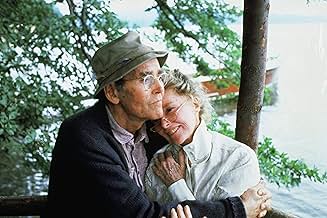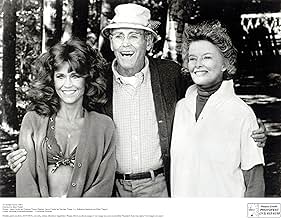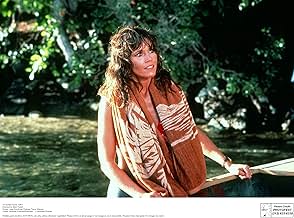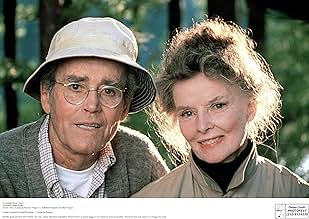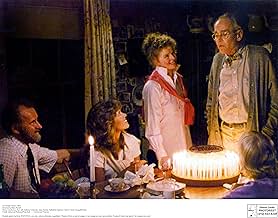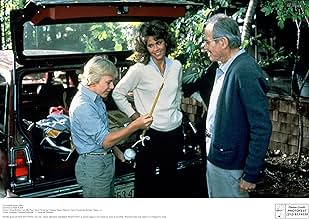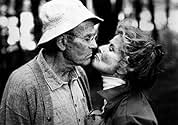CALIFICACIÓN DE IMDb
7.6/10
37 k
TU CALIFICACIÓN
Ethel y Norman Thayer son un anciano matrimonio que pasa sus vacaciones en un paradisíaco lugar, "el Estanque Dorado". Su hija Chelsea les visita con el hijo de su nueva pareja, y una inespe... Leer todoEthel y Norman Thayer son un anciano matrimonio que pasa sus vacaciones en un paradisíaco lugar, "el Estanque Dorado". Su hija Chelsea les visita con el hijo de su nueva pareja, y una inesperada relación florece.Ethel y Norman Thayer son un anciano matrimonio que pasa sus vacaciones en un paradisíaco lugar, "el Estanque Dorado". Su hija Chelsea les visita con el hijo de su nueva pareja, y una inesperada relación florece.
- Ganó 3 premios Óscar
- 15 premios ganados y 24 nominaciones en total
Opiniones destacadas
It's not many years ago I watched this film for the first time. Had to admit that before watching it I was a bit skeptical, I thought it would be just one of those boring hyper-romantic films but....
Finally when I got the chance to watch it I was breathtaken! This film is simply a masterpiece of a time that, unfortunately, is long gone. A time where love could last a lifetime and still be beautiful at the end of life. How many of those films are made today in this hasty divorce filled time? Not many I'd say!
It was such a beautiful experience to watch this film and in a strange way it made me also sad. Mainly because today's world isn't like that anymore for how many people can stay in love and care for eachother after 50 years? The theme of everlasting love, knowing eachothers habits through a whole life is really something very very special.
The roles as the elderly couple were also played with such an honesty that it was amazing and the music plus the landscape and the actual calmness of the film makes it into a film that won't ever be forgotten; at least it shouldn't be!
Of course it's romantic but it's also realistic and that's what makes it different from other socalled romantic films. There's a catch in it and there's something to think about too!
The beauty of these two old people and their relationship is something I believe many people will envy. Having been together for half a century and still being so much in love as the film shows.
A film that ought to be seen by people who still dare to believe in lifelong love and for those who don't - forget about it then you'll just waste your time or think "jee, that's ridiculous"...
Finally when I got the chance to watch it I was breathtaken! This film is simply a masterpiece of a time that, unfortunately, is long gone. A time where love could last a lifetime and still be beautiful at the end of life. How many of those films are made today in this hasty divorce filled time? Not many I'd say!
It was such a beautiful experience to watch this film and in a strange way it made me also sad. Mainly because today's world isn't like that anymore for how many people can stay in love and care for eachother after 50 years? The theme of everlasting love, knowing eachothers habits through a whole life is really something very very special.
The roles as the elderly couple were also played with such an honesty that it was amazing and the music plus the landscape and the actual calmness of the film makes it into a film that won't ever be forgotten; at least it shouldn't be!
Of course it's romantic but it's also realistic and that's what makes it different from other socalled romantic films. There's a catch in it and there's something to think about too!
The beauty of these two old people and their relationship is something I believe many people will envy. Having been together for half a century and still being so much in love as the film shows.
A film that ought to be seen by people who still dare to believe in lifelong love and for those who don't - forget about it then you'll just waste your time or think "jee, that's ridiculous"...
I grew up in the Lakes Region of New Hampshire, and was there when this movie was being filmed. It was really quite the local event. On Golden Pond not only showcases the stunning scenery of that region, but Henry Fonda & Kate Hepburn's dynamic performances truly capture the New England spirit. I can't tell you how many Ethel Thayers I met growing up!
There were three lakes used in the filming. Squam-where the cabin was. Newfound-where Henry fell into the water while fishing, among other shots, and Winnipesaukeee, for most of the aerial shots, and the mail boat. While they did combine the lakes into the fictitious `Golden Pond', what you see on the screen is what those places look like. No post-production trickery here.
There haven't been a ton of New England movies made. Good Will Hunting and Perfect Storm got a lot of attention, but On Golden Pond, in addition to being one of the finest character studies in film history, perfectly captures New England: beautiful, contemplative, with an understanding that newer isn't necessarily better, and that still waters truly run deep.
There were three lakes used in the filming. Squam-where the cabin was. Newfound-where Henry fell into the water while fishing, among other shots, and Winnipesaukeee, for most of the aerial shots, and the mail boat. While they did combine the lakes into the fictitious `Golden Pond', what you see on the screen is what those places look like. No post-production trickery here.
There haven't been a ton of New England movies made. Good Will Hunting and Perfect Storm got a lot of attention, but On Golden Pond, in addition to being one of the finest character studies in film history, perfectly captures New England: beautiful, contemplative, with an understanding that newer isn't necessarily better, and that still waters truly run deep.
There's a rather grumpy chap called Norman Thayer, as he's got older he's become quite a purveyor, of snide and sneering comments, of complaining, grieving laments, like a rusting, buckled, beat up, old conveyer; with his wife they've settled down on golden pond, a place that they both love, and are so fond, then daughter Chelsea passes by, with her new partner by her side, and a young lad that they leave there, and then they're gone; it takes a while for the curmudgeon to develop, a liking for the boy, and to envelop, but the ice quite quickly thaws, as they fish for trout with jaws, at the end you'll feel refreshed, and full of hope.
As much as I love Henry Fonda, and he is spectacular in this, it's his daughter who bowls me over, she always does, although Katherine Hepburn should take some credit too.
As much as I love Henry Fonda, and he is spectacular in this, it's his daughter who bowls me over, she always does, although Katherine Hepburn should take some credit too.
"On Golden Pond" is simply an old-fashioned testimonial to long-lost youth and facing one's mortality, and, in its simplicity, becomes a life-affirming valentine to those who feel that time has become the enemy - a seemingly ageless, universal perception. If not for the magnificent acting duet between Henry Fonda and Katharine Hepburn, this lovely, sentient piece would have been ignored by most moviegoers. But buoyed by these two acting legends, it manages to circumnavigate the heavy, mawkish waters -- rising far above and beyond anybody's expectation. Earning a whopping ten Oscar nominations, Ernest Thompson's reflective screenplay won one of those Oscars, but, for me, it's Dave Grusin's soothing, glistening score that is the stronger selling point here, adding immeasurably to the film's ruminative tone and gently rustic surroundings.
Henry Fonda plays brusque, cantankerous Norman Thayer, a one-time college professor approaching his 80th birthday with a mixture of anger, cynicism and fear as he shows signs of losing his faculties. Norman is not a particularly kind or considerate gent. Abrupt, callous, remote, and ill-equipped to offer nurturing support of any kind, living with Norman must have been quite an ordeal for those growing up under his roof. As a means of self-preservation, their only child, Chelsea, has long estranged herself from the family, unable to emotionally come to terms with her unhappy, unhealthy relationship with her father.
Fonda offers the most affecting, endearing performance of his durable career. He manages to use Norman's undesirable traits to his advantage, investing in his character a gruff charm and cynical sense of humor that is totally winning. He melts away the harmful, negative elements, as Carroll O'Connor managed to do for Archie Bunker, and makes Norman not only funny and entertaining, but loveable. As a result, Fonda becomes the glowing centerpiece of `On Golden Pond,' and it is this portrayal, along with his `Grapes of Wrath' Tom Joad, that will remain indelibly etched in our hearts and minds for decades to come.
Kate Hepburn is his Ethel, a loving, pragmatic anchor who obviously has played an important role in the lifetime success of this complicated man. Devoted to a tee, Ethel understands and compensates for the weaknesses of her husband. She valiantly assuages his deepening fears with good-natured kidding, feigned hopelessness, and careful but subtle guidance. She is Dulcinea to his Don Quixote. As a lioness would shield an endangered cub, she has automatically assumed the roles of caregiver, protectorate and confidence booster without pause or grief. Only for Ethel does Norman step out of his shield of emotional armor and display a genuine affection that is lost to others, including himself. Hepburn absolutely radiates with warmth and vitality, providing the film with a necessary center. Though less flashy and substantive, both she and Fonda were Oscared for their work here, with Hepburn winning a record-breaking fourth 'Best Actress' award. Incidentally, this was their ONLY screen pairing, yet they work together as if they've known each other all their lives.
Fifteen-year-old Doug McKeon manages to hold his own among the star power here as a young resentful upstart whose dentist father (Dabney Coleman) is romantically involved with Chelsea. Forced to play out the rest of his summer with the old folks while his father and girlfriend spend quality time together, he learns a delicate lesson or two as he develops an unlikely bond with Norman. Coleman himself has one edgy, amusing scene as he tries to gracefully deal with an overly wry Norman.
Surprisingly, the weakest story link involves Norman's strained relationship with daughter Chelsea, played by Hank's own daughter, Jane Fonda (Oscar-nominated). The familial situation obviously parallels their own real-life lack of connection, but the scenes seem strangely shallow and self-serving as they forge through some mucky emotional moments as if striving for real-life closure. What should have been insightful and compelling comes off forced and distracting, particularly on Jane's part.
Henry Fonda's own physical frailty at the time of shooting adds a special poignancy to the film. Ironically, Hepburn won her second Oscar in 1967 for playing another wifely Rock of Gibraltar in `Guess Who's Coming to Dinner?' The ailing Spencer Tracy died shortly after the completion of that film. Fonda would pass away a few months after winning his only Oscar.
A most welcome and satisfying diversion that touches with its unpretentiousness, `On Golden Pond' is a lovely, lovely little film that should resonate for ages to come.
Henry Fonda plays brusque, cantankerous Norman Thayer, a one-time college professor approaching his 80th birthday with a mixture of anger, cynicism and fear as he shows signs of losing his faculties. Norman is not a particularly kind or considerate gent. Abrupt, callous, remote, and ill-equipped to offer nurturing support of any kind, living with Norman must have been quite an ordeal for those growing up under his roof. As a means of self-preservation, their only child, Chelsea, has long estranged herself from the family, unable to emotionally come to terms with her unhappy, unhealthy relationship with her father.
Fonda offers the most affecting, endearing performance of his durable career. He manages to use Norman's undesirable traits to his advantage, investing in his character a gruff charm and cynical sense of humor that is totally winning. He melts away the harmful, negative elements, as Carroll O'Connor managed to do for Archie Bunker, and makes Norman not only funny and entertaining, but loveable. As a result, Fonda becomes the glowing centerpiece of `On Golden Pond,' and it is this portrayal, along with his `Grapes of Wrath' Tom Joad, that will remain indelibly etched in our hearts and minds for decades to come.
Kate Hepburn is his Ethel, a loving, pragmatic anchor who obviously has played an important role in the lifetime success of this complicated man. Devoted to a tee, Ethel understands and compensates for the weaknesses of her husband. She valiantly assuages his deepening fears with good-natured kidding, feigned hopelessness, and careful but subtle guidance. She is Dulcinea to his Don Quixote. As a lioness would shield an endangered cub, she has automatically assumed the roles of caregiver, protectorate and confidence booster without pause or grief. Only for Ethel does Norman step out of his shield of emotional armor and display a genuine affection that is lost to others, including himself. Hepburn absolutely radiates with warmth and vitality, providing the film with a necessary center. Though less flashy and substantive, both she and Fonda were Oscared for their work here, with Hepburn winning a record-breaking fourth 'Best Actress' award. Incidentally, this was their ONLY screen pairing, yet they work together as if they've known each other all their lives.
Fifteen-year-old Doug McKeon manages to hold his own among the star power here as a young resentful upstart whose dentist father (Dabney Coleman) is romantically involved with Chelsea. Forced to play out the rest of his summer with the old folks while his father and girlfriend spend quality time together, he learns a delicate lesson or two as he develops an unlikely bond with Norman. Coleman himself has one edgy, amusing scene as he tries to gracefully deal with an overly wry Norman.
Surprisingly, the weakest story link involves Norman's strained relationship with daughter Chelsea, played by Hank's own daughter, Jane Fonda (Oscar-nominated). The familial situation obviously parallels their own real-life lack of connection, but the scenes seem strangely shallow and self-serving as they forge through some mucky emotional moments as if striving for real-life closure. What should have been insightful and compelling comes off forced and distracting, particularly on Jane's part.
Henry Fonda's own physical frailty at the time of shooting adds a special poignancy to the film. Ironically, Hepburn won her second Oscar in 1967 for playing another wifely Rock of Gibraltar in `Guess Who's Coming to Dinner?' The ailing Spencer Tracy died shortly after the completion of that film. Fonda would pass away a few months after winning his only Oscar.
A most welcome and satisfying diversion that touches with its unpretentiousness, `On Golden Pond' is a lovely, lovely little film that should resonate for ages to come.
Mark Rydell's On Golden Pond was a surprise hit in 1981, finishing third in box office grosses after Rocky III and E.T. Such an occurrence was unheard of in Hollywood, considering the key players in the film, Henry Fonda and Katharine Hepburn, each had not had a hit film in almost twenty years and were both hardly spring chickens in the business. Both these veteran actors proved they could still make it in Hollywood among young starlets, and triumph. Still, when you see "On Golden Pond," you sense that their teaming together for the first time in their careers is purely a special occasion, an opportunity of a lifetime that few actors in their seventies receive. They in turn have left us with a wonderful showcase of movie talent, a film of warmth, good humor, and love.
It always amazes me when I read that Henry Fonda had only received two Oscar nominations during his career, one of which he earned for this film. Like his good friend Jimmy Stewart, Fonda was rarely a boisterous actor. He had a natural ease to his acting, a gift for making audiences believe that every word he uttered was truth. Now, in his final screen performance as Norman Thayer Jr., Fonda had to reach deep into his own personal experience and his advancing years to create a character who struggles with his own mortality. Norman is a grouchy curmudgeon who has memory lapses and heart palpitations. He has a loving and cheerful wife, Ethel (Hepburn), but a difficult relationship with his only daughter, Chelsea (Jane Fonda). He and Ethel journey back to their cottage on the lake for what may be their last summer. Immediately, Norman comes face to face with his old age and his inability to remember what should be familiar sights. I especially like the scene where he gets lost in the woods looking for strawberries and scares himself when he is unable to find his way back. Ethel has such faith in him, sure he will "get back on that horse" and be as valiant as he once was. What more could you want from a wife?
Chelsea arrives after many years away from her parents, bringing with her a new boyfriend (Dabney Coleman) and his son, Billy (Doug McKeon). You can sense the tension between Chelsea and Norman the minute she walks in the door. This reunion is fascinating not only because we can never tell where the difficulty lies in their relationship, but also the fact that these problems also exist on and off the screen. The father-daughter relationship between Henry and Jane was also very turbulent ever since Jane began her protests in Vietnam, much to the chagrin of her father. This collaboration of the two was meant to mend fences between them. Not often do the personal lives of actors collide so eloquently in Hollywood, but here it seems just about right.
The sequence where Norman and Bill (Coleman) attempt to build a conversation is originally conceived and acted so naturally. He carefully asks Norman if it would be alright if Chelsea and he sleep together in the same room at the cottage. Of course, Norman makes this confrontation as difficult as possible, making Bill nervous and jerking him around. Ironically, Bill comes back at him, not allowing Norman to use him in petty mindgames and hoping they would become friends, which is obviously "not an easy task." This is an unsettling turn for Norman and the audience, but it is necessary for the story to progress and for Norman to respond accordingly to the other characters in the story.
Ethel and Norman volunteer to let Billy stay with them for the summer while Chelsea and Bill head off to Europe. Billy is not pleased with the arrangement at the outset, but gradually bonds with Norman through learning to fish on the pond. While Billy is not necessarily an original character, it is fascinating to see him try to understand Norman, and in turn how Norman learns to associate with the son he never had. It is a learning experience for both of them, even though they are many generations apart.
Many reviewers have remarked that ON GOLDEN POND uses a conventional story and revives it with great performances from the cast. It is interesting to note that the screenwriter, Ernest Thompson, altered his own play in order to escape a bit of the conventionality that the film medium required. The framework may seem as original as an old shoe, but the added touches in the script and its delivery give this film a certain magic that only classical Hollywood films possessed. Fonda has a great way to end a career with this role, placing himself completely within Norman's world and searching within and through the role for his own solutions to life's problems. His Oscar was given to him for more reasons than mere charity. Hepburn is delightful as Ethel, working so well with Fonda that it does not seem as if they are acting. For a couple of old Hollywood actors who never even met before this, they each prove they are true masters of their craft. Jane Fonda takes a supporting role this time, incorporating some of the same motives as her father into her part, and as a result delivers a special performance. Mark Rydell is one of those directors that often gets left off the list of the all-time greats, but proves once again here he is a masterful storyteller. In this project, he allows both the visual elements of the pond and his actors to make magic, a truly memorable combination.
On Golden Pond is not an epic, but what it accomplishes runs close to epic proportions. It is very rare that a stageplay converts so well to the screen like this one. On Golden Pond is vibrant, emotional, and so heartfelt, it is impossible not to like, unless you are a curmudgeon like Norman Thayer. It is also unique that great actors such as these will agree to try again for Hollywood glory so late in their careers. It is up to us viewers to experience this wonder before the chance is lost and these thespians finally close up the cottage and head off to their retirement.
It always amazes me when I read that Henry Fonda had only received two Oscar nominations during his career, one of which he earned for this film. Like his good friend Jimmy Stewart, Fonda was rarely a boisterous actor. He had a natural ease to his acting, a gift for making audiences believe that every word he uttered was truth. Now, in his final screen performance as Norman Thayer Jr., Fonda had to reach deep into his own personal experience and his advancing years to create a character who struggles with his own mortality. Norman is a grouchy curmudgeon who has memory lapses and heart palpitations. He has a loving and cheerful wife, Ethel (Hepburn), but a difficult relationship with his only daughter, Chelsea (Jane Fonda). He and Ethel journey back to their cottage on the lake for what may be their last summer. Immediately, Norman comes face to face with his old age and his inability to remember what should be familiar sights. I especially like the scene where he gets lost in the woods looking for strawberries and scares himself when he is unable to find his way back. Ethel has such faith in him, sure he will "get back on that horse" and be as valiant as he once was. What more could you want from a wife?
Chelsea arrives after many years away from her parents, bringing with her a new boyfriend (Dabney Coleman) and his son, Billy (Doug McKeon). You can sense the tension between Chelsea and Norman the minute she walks in the door. This reunion is fascinating not only because we can never tell where the difficulty lies in their relationship, but also the fact that these problems also exist on and off the screen. The father-daughter relationship between Henry and Jane was also very turbulent ever since Jane began her protests in Vietnam, much to the chagrin of her father. This collaboration of the two was meant to mend fences between them. Not often do the personal lives of actors collide so eloquently in Hollywood, but here it seems just about right.
The sequence where Norman and Bill (Coleman) attempt to build a conversation is originally conceived and acted so naturally. He carefully asks Norman if it would be alright if Chelsea and he sleep together in the same room at the cottage. Of course, Norman makes this confrontation as difficult as possible, making Bill nervous and jerking him around. Ironically, Bill comes back at him, not allowing Norman to use him in petty mindgames and hoping they would become friends, which is obviously "not an easy task." This is an unsettling turn for Norman and the audience, but it is necessary for the story to progress and for Norman to respond accordingly to the other characters in the story.
Ethel and Norman volunteer to let Billy stay with them for the summer while Chelsea and Bill head off to Europe. Billy is not pleased with the arrangement at the outset, but gradually bonds with Norman through learning to fish on the pond. While Billy is not necessarily an original character, it is fascinating to see him try to understand Norman, and in turn how Norman learns to associate with the son he never had. It is a learning experience for both of them, even though they are many generations apart.
Many reviewers have remarked that ON GOLDEN POND uses a conventional story and revives it with great performances from the cast. It is interesting to note that the screenwriter, Ernest Thompson, altered his own play in order to escape a bit of the conventionality that the film medium required. The framework may seem as original as an old shoe, but the added touches in the script and its delivery give this film a certain magic that only classical Hollywood films possessed. Fonda has a great way to end a career with this role, placing himself completely within Norman's world and searching within and through the role for his own solutions to life's problems. His Oscar was given to him for more reasons than mere charity. Hepburn is delightful as Ethel, working so well with Fonda that it does not seem as if they are acting. For a couple of old Hollywood actors who never even met before this, they each prove they are true masters of their craft. Jane Fonda takes a supporting role this time, incorporating some of the same motives as her father into her part, and as a result delivers a special performance. Mark Rydell is one of those directors that often gets left off the list of the all-time greats, but proves once again here he is a masterful storyteller. In this project, he allows both the visual elements of the pond and his actors to make magic, a truly memorable combination.
On Golden Pond is not an epic, but what it accomplishes runs close to epic proportions. It is very rare that a stageplay converts so well to the screen like this one. On Golden Pond is vibrant, emotional, and so heartfelt, it is impossible not to like, unless you are a curmudgeon like Norman Thayer. It is also unique that great actors such as these will agree to try again for Hollywood glory so late in their careers. It is up to us viewers to experience this wonder before the chance is lost and these thespians finally close up the cottage and head off to their retirement.
¿Sabías que…?
- TriviaThe brown Fedora worn by Henry Fonda belonged to Spencer Tracy and was given to Fonda by Katharine Hepburn on the first day on the set. Overwhelmed with the gesture, Fonda painted a still life watercolor of the three hats he wore in the film and gave the original to Hepburn as a gift. He had 200 lithographs made of the painting and sent one to every person who worked on the film. Each copy was numbered and personally signed by Fonda, thanking each person by name. In her autobiography, Hepburn wrote that she gave the painting to screenwriter Ernest Thompson. After Fonda's death, she found the painting to be a sad reminder of him and Tracy.
- ErroresThe numbers of the pump show the cost of fuel to be 67.9 cents per gallon with a total cost of $19.00. The price of gasoline in 1981 was around $1.30 per gallon.
However, old pumps were not capable of charging more than 99.9 cents per gallon, so they were set to half the price, and the total was then doubled. That is why the teenager asks for $38.00.
- Versiones alternativasWhen premiered on TV, an extra credit dedicated to Henry Fonda was added to the final credits.
- ConexionesEdited into Reflections on Golden Pond (2003)
- Bandas sonorasHappy Birthday to You
(uncredited)
Written by Mildred J. Hill & Patty S. Hill
[Sung by all for Norman's birthday]
Selecciones populares
Inicia sesión para calificar y agrega a la lista de videos para obtener recomendaciones personalizadas
- How long is On Golden Pond?Con tecnología de Alexa
Detalles
- Fecha de lanzamiento
- País de origen
- Idioma
- También se conoce como
- On Golden Pond
- Locaciones de filmación
- Squam Lake, New Hampshire, Estados Unidos(Main lake)
- Productoras
- Ver más créditos de la compañía en IMDbPro
Taquilla
- Presupuesto
- USD 7,500,000 (estimado)
- Total en EE. UU. y Canadá
- USD 119,285,432
- Fin de semana de estreno en EE. UU. y Canadá
- USD 89,213
- 6 dic 1981
- Total a nivel mundial
- USD 119,285,810
Contribuir a esta página
Sugiere una edición o agrega el contenido que falta


